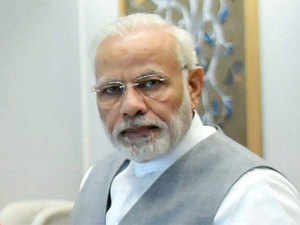 PTI
PTIEven as Gujarat’s chief minister, he was known for his personal style of diplomacy: His strong friendship with Japanese Prime Minister Shinzo Abe dates back to his days in Gandhinagar. That friendship was to pay rich dividends when Modi became Prime Minister several years later. It helped secure concessional financing for his dream project – the bullet train - and the civilian nuclear deal.
It, therefore, came as no surprise when at his swearing-in on May 26, 2014, Modi took the bold step of inviting all the leaders of SAARC countries, setting the stage for a new sort of diplomacy that has left its mark in his external dealings in the past four years. Among his initiatives is to host the world leaders outside Delhi.
The prime minister is of the view that this allows them to get a perspective of the vastness and diversity of India, while offering different states a first-hand opportunity to pitch their strengths directly to foreign dignitaries. It complements Modi’s policy of competitive federalism.
The Wuhan visit will be the first time that an Indian Prime Minister is attending an informal summit shorn of protocol - and outside the national capital. It is, perhaps, also a first for the President of China in his own country. Their interaction thus provides a new format for diplomacy at the highest level which could become the diplomatic norm in the future.
Xi Jinping was, co-incidentally, the first foreign leader with whom Modi travelled to Gujarat. Later, the premiers of Japan and Israel, the chancellor of Germany and the president of France accompanied Modi to various parts of India, and these visits have helped promote India's diplomatic, national security and economic interests, according to people who have followed Modi's diplomatic style closely. In Wuhan, Modi and Xi are expected to visit a museum together on Friday and take a boat ride on the East Lake Saturday morning.
The PM's diplomatic gestures have been reciprocated during his travels to various countries. His visit to the Martin Luther King Memorial in Washington along with the then President Obama, as well as his boat trip on the river Seine in Paris with the then French President Hollande set the platform for a free exchange of views, free from protocol.
The Sri Lankan leadership has accompanied him to Kandy and Jaffna. He persuaded Prime Minister Najib of Malaysia and Prime Minister Lee Hsien Loong of Singapore to accompany him to the Indian quarter in Kuala Lumpur and Singapore, to highlight the contributions of the Indian communities in their nation building. He made the point of going with Netanyahu to the Agricultural Centre for Excellence for Vegetables and Fruits jointly set up in Gujarat as a way of demonstrating that diplomacy must translate into people-centric programmes. Perhaps, his most dramatic gesture was his decision to visit Lahore in December 2015 in an effort to build relations with Pakistan.
Modi also goes the extra mile to associate his visitors with his own vision and national programmes, as he showed recently by accompanying French President Macron to remote Mirzapur district in eastern Uttar Pradesh to jointly inaugurate a solar power facility, just days after he had successfully hosted the Founding Conference of the International Solar Alliance in New Delhi in March. The ISA is now being seen as, perhaps, the only tangible outcome of the Paris Conference on Climate Change, and received favourable mention from foreign leaders at the CHOGM meeting in London earlier this month. Noteworthy too is the presence of several foreign leaders including, most recently, the Prime Minister of Sweden, as well as others like the President of Kenya and the former Prime Minister of the UK, at diaspora gatherings during his visits abroad.
That his personal style is a diplomatic asset was evident in his recent visits to the Gulf countries. During his visit to Abu Dhabi, the Crown Prince accompanied by his five brothers received the Prime Minister at the airport, a rare honour for any visiting dignitary. The King of Jordan offered his personal helicopter for Modi’s visit to Palestine. The advancement of national objectives and interests during these visits, including the clear demonstration of India’s continued commitment to the cause of Palestine, and the first strategic acquisition of oil fields in the Gulf, were thus facilitated by the personal friendship that he has assiduously cultivated with leaders of West Asia and the Gulf.
The PM has also increasingly worked the phones to strengthen ties with key leaders including Presidents Trump, Putin (three times since January) and Xi. He has not hesitated to call his counterparts in seeking their support in securing interests in multilateral fora and obtaining membership of export control regimes like the MTCR, the Wassenaar Arrangement and the Australia Group. His individual efforts at convincing leaders also yielded positive results during the fiercely contested ICJ elections, according to people familiar with the matter. In the information age, when news travels at the speed of light and developments call for prompt action, his personal style is to modernize the practice of diplomacy to meet the demands of the 21st century.
Bilateral, global issues to be discussed during meet: Modi
In his departure statement on Thursday evening, PM Modi said: "President Xi and I will exchange views on a range of issues of bilateral and global importance. We will discuss our respective visions and priorities for national development, particularly in the context of current and future international situation. We will also review the developments in the India-China relations from a strategic and long-term perspective."
Download The Economic Times News App to get Daily Market Updates & Live Business News.
Subscribe to The Economic Times Prime and read the ET ePaper online.
Download The Economic Times News App to get Daily Market Updates & Live Business News.
Subscribe to The Economic Times Prime and read the ET ePaper online.









 Get Unlimited Access to The Economic Times
Get Unlimited Access to The Economic Times
